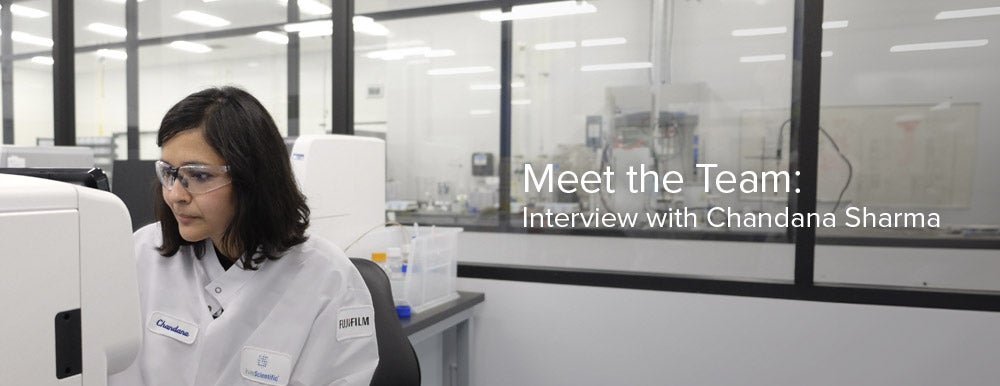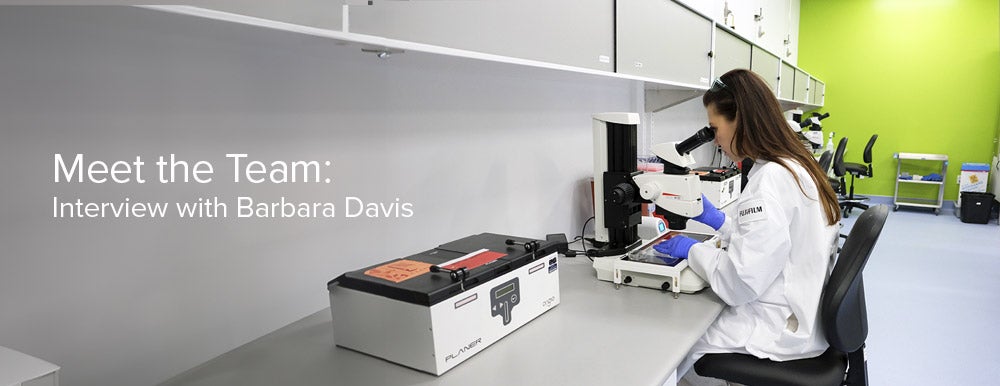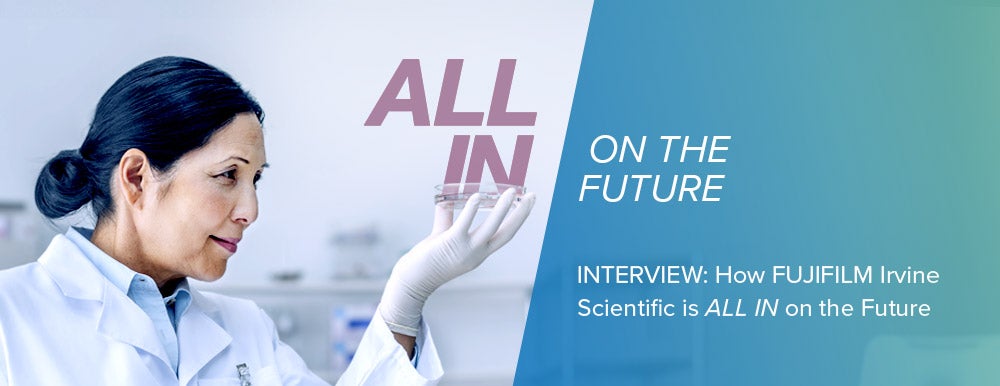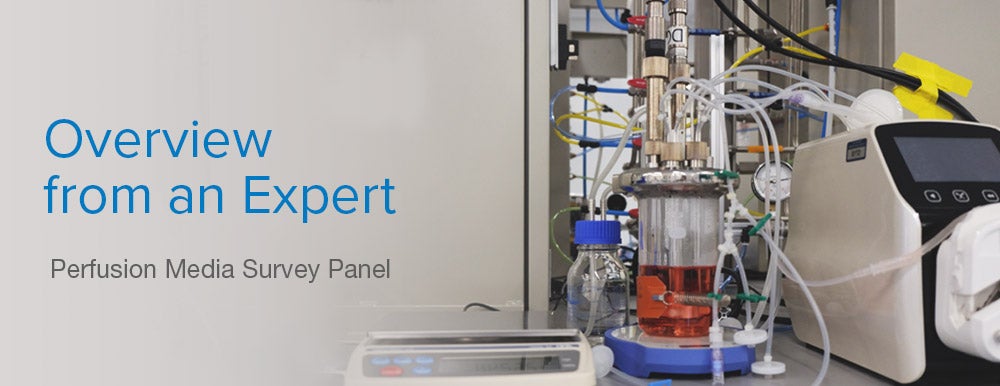We use cookies to make your experience better. To comply with the new e-Privacy directive, we need to ask for your consent to set the cookies. Learn more.
Meeting the Evolving Challenges of Media Supply to the Cell and Gene Therapy Space
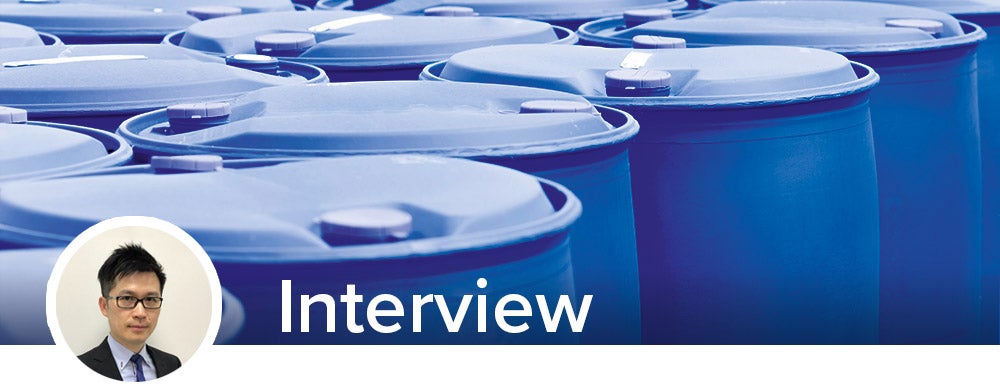
An interview with Jason C. Lin, FUJIFILM Irvine Scientific Director of Global Supply Chain
What are the major challenges in media production and supply to the cell therapy supply chain?
Jason: Generally, the challenges are not directly supply related. In terms of the business aspect, it’s more about getting the best value and service from the suppliers. We also want to ensure consistency of supply, which is why FUJIFILM Irvine Scientific utilizes multiple approaches to mitigate risk.
For example, the situation with the coronavirus both directly and indirectly impacted the supply chain. We address potential supply risks such as this from our end. We are in a position to prepare for them by having robust inventory, as well as dual sources with multiple sites capable of producing material globally. It’s a challenge, but we have a plan to address it on an ongoing basis.
How do you manage challenges that sometimes exist between media suppliers and the cell therapy industry?
Jason: Suppliers are eager to be part of the process from early on, and they hope to see business growth and be part of continuing collaborations by getting into the R&D phase of the business. To ensure an uninterrupted supply for cell therapy customers, we want to see a demonstrable track record and ask ourselves if we are aligned in commercial value-adds. Ultimately we need to be seeing quality and consistency from suppliers before we can commit to a partnership. What the supplier wants has to be balanced against what we need as a company in the long term, because we are in the business to ensure uninterrupted supply, quality, and also the most effective and robust pricing of the products we produce.
What are FUJIFILM Irvine Scientific’s procedures for the qualification of raw materials for media?
Jason: Once a supplier is qualified, the starting point for raw material is always to have the right documentation. Documentation could include the Certificate of Analysis, TSE/BSE statements (which concerns whether the ingredient is animal-derived or not), and any other relevant documentation on the materials side. To qualify a supplier, we look at anything about the manufacturing site itself, the production history, and what Quality System the supplier has in place.
Also, we ask for samples of new raw materials, typically three separate manufacturing lots, to process through our Quality System for testing and evaluation. The decision to qualify a material for use or not takes all these actions into account.
What is your approach to ensuring continuity of supply?
Jason: That’s always a relevant topic for supply chains in general. It is vital to begin by qualifying a supplier. We consider matters such as whether a supplier will put us in a single sourcing or challenging supplier situation, which can become more difficult to address later on in the commercial production phase. Making these judgments early on can have a significant impact on our decisions and business further down the road.
Once we qualify a supplier, a robust supply agreement is put into place. We have terms and conditions to protect us as the customer, just in case the supplier decides to divest or close the business. This gives us the right to procure materials up to a certain point in time, typically nine months to a year, until we have a chance to find an alternative source.
With a supply agreement in place, the next thing we would do is look for alternatives and qualify the new supplier in the portfolio as early on as possible. Finding a new supplier can be a challenge sometimes, because there may not be other suitable alternatives in the market for the same type of products – that’s an issue we’re always dealing with.
Lastly, building a relationship between the supplier and our R&D team is crucial. We must have good relationships with the supplier, so that when we’re in a time of need or there is a global shortage, we are considered an essential customer at the top of the list to have our needs fulfilled.
This is the process we like to follow if we can—it’s not always possible, but our philosophy is to employ good decision making from the beginning at all times.
How is the demand for media for cell therapy production evolving worldwide, and what are the keys for you in meeting the needs of this global sector?
Jason: There is a high rate of growth in the biopharmaceutical market, with cell therapies moving into clinical trials and commercialization at a fast pace. From my time working in the Asia-Pacific market, as well as with the US and Europe, I can construct a global forecasting strategy to support this growth, incorporating flexibility and consistency while keeping apprised of trends in supply interruptions or bottlenecks.
Working closely with our Regulatory department is also crucial for understanding global regulations for raw materials and components that are permitted in each country. For example, Japan restricts certain components, so R&D/Formulation scientists, regulatory experts, and supply must partner to ensure we meet specific needs.
It is also vital that we grow in tandem with the market to exceed production requirements to address the increasing need of our customers worldwide. Our current capacity is >1,000,000 Kg per year of dry powder. To meet increasing customer demand, as well as the requirement from our European customers for regional support, we are building a third, world-class cGMP manufacturing facility to serve as a European hub and provide rapid, reliable supply of products for our customers.
What are the future media or critical raw material supply trends you foresee for the cell therapy space? How is FUJIFILM Irvine Scientific mobilizing to prepare for them?
Jason: We plan to focus on the ingredients that are driving the core volume of our business. Meaning that as we get requests for different formulations, whether it’s a customer product or our product, we have to dig into all the sub-components and determine and rank the risk assessment level for each material and make preparations for each. FUJIFILM Irvine Scientific expert advisement can help customers circumvent formulations that present a risk due to limited or single-supply situations or regulatory hurdles. If such a scenario is the only available option, we must have a plan to ensure supply.
Implementing risk mitigation strategies, such as having robust inventory, safety stock, and other value-added activities, gives us confidence in our ability to meet supply chain challenges continually. A well-managed supply chain starts with raw materials and ends with a finished product or therapy.
Cell therapies demand an uninterrupted supply of high-quality cell culture media. At FUJIFILM Irvine Scientific, we believe meeting that demand requires a holistic strategy. We carefully manage the entire process from the raw material supply chain and assessment of components during formulation to GMP and robust cold chain logistics.
As more therapies move towards clinical phases, meeting regulatory requirements is becoming increasingly more critical. Our Quality Management System, processes, and experience with global regulations ideally position us to provide the right support to our customers. We feel optimistic about our proven track record in partnering with our customers and our continued efforts to support their needs in the future.
Jason C Lin
Director of Global Supply Chain
With two decades of experience in global pharmaceutical/biotech material and product supply chain strategic settings, Jason Lin applies his expertise as the Director of Global Supply Chain with FUJIFILM Irvine Scientific. He oversees end-to-end raw materials planning, procurement, and materials management for media products across various business units, as well as drives Cost of Goods reduction actions such as manufacturing dispositions, raw materials/finished goods inventory control, and long-term materials pricing contractual agreements. Jason has previously worked for leading biotech companies including JHL Biotech and Roche. He holds a Master of Science degree in Industrial Management and a Bachelor of Science degree in Industrial Engineering, both from Clemson University.


